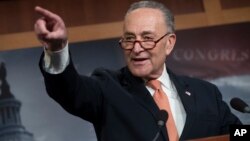WASHINGTON —
The United States government headed back to work Tuesday, but Russia does not appear to be done trying to capitalize on the nearly three-day-long shutdown.
U.S. President Donald Trump signed a bill late Monday, funding the government through February 8. But even as lawmakers and the White House reached agreement, Twitter accounts linked to Russian influence operations continued to post hashtags seemingly aimed at amplifying the country’s political divisions.
Throughout the three-day shutdown, the governing Republicans and opposition Democrats each sought to pin the blame on the other, with the Democrat Party labeling it the Trump Shutdown while Trump and his Republican Party allies using the more alliterative Schumer Shutdown – a reference to the Senate’s top Democrat, Chuck Schumer of New York.
Among those using #schumershutdown Monday were U.S. Vice President Mike Pence and Trump’s son, Donald Trump, Jr. “Thanks to the firm stand taken by @POTUS & Senate & House Republicans, the gov't shutdown is coming to an end. The #SchumerShutdown failed,” Pence tweeted Monday while visiting Israel.
But the Schumer label was getting a big boost from Russian-linked websites according to
Hamilton 68, an online site run by the German Marshall Fund think tank that monitors trends on about 600 Twitter accounts with ties to Moscow. As of 10 p.m. ET Monday night, the hashtag #schumershutdown had been used 535 times in the previous 48 hours, it said.
The core issue in the shutdown was a Democratic demand for legislation to protect the so-called “Dreamers,” undocumented immigrants brought to America as children, from possible deportation. In the end, the Democrats won only a verbal promise to debate and vote on the issue in the coming days.
That prompted the rise of another top hashtag that cast the Democratic leader in a poor light: #schumersellout. Use of that hashtag, suggesting the Democrats have given up too easily, increased by 4,800 percent on the Russian-linked websites monitored by Hamilton 68.
The #schumersellout hashtag began trending on Twitter Monday, used in 19,700 tweets as of about 10 p.m. ET. While many of those using the hashtag may have been frustrated Dreamers and their allies, it also was used by at least some Republicans hoping to embarrass the Democrats.
Among the accounts using it was the Michigan Republican Party, which tweeted, “Schumer Sells Out the Resistance #SchumerSellout,” along with a link to an opinion column in The New York Times.
The Hamilton 68 website makes clear that hashtags like #schumershutdown or #schumersellout are often not created by the Russian-linked accounts. Instead, they often take hashtags created by Twitter users who are not necessarily linked to Russia and try to amplify them to help perpetuate existing divides.
The site said other top hashtags being heavily promoted by the Russian-linked accounts included "releasethememo", "QAnon", "maga", "Syria", "nodaca", "wethepeople" and "Russia."
#ReleasetheMemo, which the Russian-linked accounts tweeted 480 times Sunday and Monday, saw their heaviest usage late last week (Thursday and Friday), when the accounts tweeted the hashtag more than 3,000 times.
It also gained popularity among Twitter users, including some in Congress, pushing the House Intelligence Committee to release a confidential report written by the committee’s chairman, Republican Devin Nunes.
They argued the report shed light on bias at the FBI and the Department of Justice, both of which have been investigating possible ties between the Trump presidential campaign and Russia.
U.S. intelligence officials and lawmakers from both parties have warned Russia is continuing to try to meddle in U.S. politics with an eye on the 2018 midterm elections. Russia has denied the allegation.
"They're trying to undermine Western democracy," Director of National Intelligence Dan Coats told the Aspen Security Forum this past July, admitting Russia's influence efforts are "quite a bit more sophisticated than they used to be."
"I think all of my colleagues probably are worried or should be worried about it," Senate Intelligence Committee chairman Richard Burr warned last month.
"To believe that Russia's not attempting in the United States to do things potentially for the '18 cycle I think would be ignorant on our part," Burr said.









